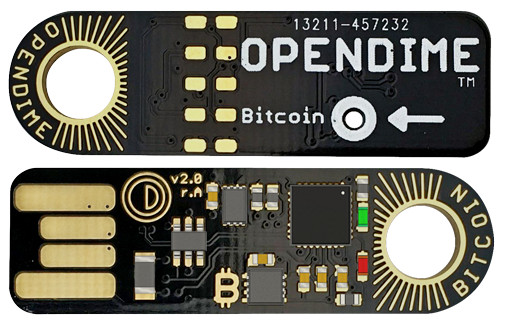The first time I heard about crypto currencies, specifically Bitcoin, was probably around 2011, and later in May 2012, I noticed a “micro-payments with Bitcoin digital currency” talk at a Barcamp. I did not think much of it at the time, but with hindsights, I should definitely have started to mine some Bitcoins considering the price was $5. Nevertheless, cryptocurrencies appear to be here to stay, and while most transactions occurs over the Internet, Opendime project has made a hardware USB dongle to store Bitcoins, and earlier this year, announced version 2 of their “Verified Bitcoin Credit Stick”.
 Hardware specifications of OpenDime v2.0 / v2.1 USB stick:
Hardware specifications of OpenDime v2.0 / v2.1 USB stick:
- MCU – Microchip / Atmel SAMD21 Cortex M0 MCU
- Security Chip – Microchip / Atmel ATECC508A Crypto chip with support for SHA-256, TRNG, and public key signing (ECDSA)
- USB 2.0 interface to connect to a computer
- Bitcoin seal
The USB stick works like a piggy bank, you can add Bitcoins to it changing the status from new to sealed, but you can not use them until you “break the seal”, that is pushing through the Bitcoin hole that will remove a resistor and change the status to un-sealed.
Once connected to a computer, you can copy some of your files in order to create a randomly generated private-key. The drive won’t save your files, and become read-only. Once this is done, you should see an index.htm file in the stick that you can use to verify the stick, and add Bitcoins from your own wallet. You can then give your OpenDime to somebody to make a payment. More info can be found in the github repo, full instructions are also located inside the OpenDime, and the video below gives an overview of OpenDime, and shows how to use it.
I’m not sure I get the advantages of using such hardware key for Bitcoin payments, but the company explains it could be used for the following use cases in the FAQ:
- Gift someone a Bitcoin. Put it on an Opendime and mail it to them. Simple!
- Deliver the payment for a car when you go to pick it up. Just put your payment on an Opendime and hand it over when you get the keys. Private key for car keys!
- Load a number of Opendimes with various denominations of Bitcoin. Keep them in your pocket to pay for things through-out your day.
- Sell Opendimes, preloaded with value, in exchange for gold or other precious metals.
- Use this instead of a paper wallet. Just as “compatible” but takes care of generating the private key safely.
If you are interesting you can purchase OpenDime keys starting at $37.50 for one pack of 3 boards, and to up to 8 packs of 3 boards for $300 plus shipping. That’s over $12 per board, so while it acts like “Bitcoin cash”, the hardware price only makes it suitable for larger amounts.

Jean-Luc started CNX Software in 2010 as a part-time endeavor, before quitting his job as a software engineering manager, and starting to write daily news, and reviews full time later in 2011.
Support CNX Software! Donate via cryptocurrencies, become a Patron on Patreon, or purchase goods on Amazon or Aliexpress




